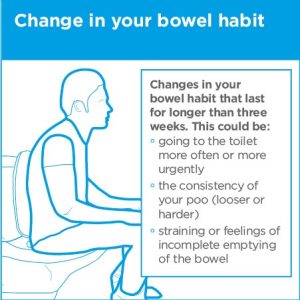GRIFFIN TOILET HIRE TALK BOWEL CANCER
GRIFFIN TOILET HIRE TALK BOWEL CANCER
People are ignoring bowel cancer symptoms because they’re too embarrassed to talk about their toilet habits
Worryingly, only two out of five people are diagnosed in stages one or two, when it is most treatable.
“Don’t be embarrassed. Checking your symptoms can save your life.”

The symptoms of bowel cancer can include:
- Bleeding from your bottom and/or blood in your poo.
- A persistent and unexplained change in bowel
- Unexplained weight loss.
- Extreme tiredness for no obvious reason.
- A pain or lump in your tummy.
The exact cause of bowel cancer is still unknown. However, research has shown several factors may make you more likely to develop it.
Cancer occurs when the cells in a certain area of your body divide and multiply too rapidly. This produces a lump of tissue known as a tumour.
Most cases of bowel cancer first develop inside clumps of cells called polyps on the inner lining of the bowel. However, it doesn’t necessarily mean you’ll get bowel cancer if you develop polyps.
Some polyps regress, and some don’t change. Only a few grow and eventually develop into bowel cancer over a period of several years.

The main risk factors for bowel cancer are outlined below.
Age
Around 1 in 20 people develop bowel cancer. Almost 18 out of 20 cases of bowel cancer in the UK are diagnosed in people over the age of 60.
Family history
Having a family history of bowel cancer in a first-degree relative – a mother, father, brother or sister – under the age of 50 can increase your lifetime risk of developing the condition yourself.
Diet
A large body of evidence suggests a diet high in red and processed meat can increase your risk of developing bowel cancer.
For this reason, the Department of Health advises people who eat more than 90g (cooked weight) a day of red and processed meat cut down to 70g a day.
There’s also evidence that suggests a diet high in fibre could help reduce your bowel cancer risk.
Smoking
People who smoke cigarettes are more likely to develop bowel cancer, as well as other types of cancer and other serious conditions, such as heart disease.
Alcohol
Drinking alcohol has been shown to be associated with an increased risk of bowel cancer, particularly if you regularly drink large amounts.
Obesity
Being overweight or obese is linked to an increased risk of bowel cancer, particularly in men.
If you’re overweight or obese, losing weight may help lower your chances of developing the condition.
Inactivity
People who are physically inactive have a higher risk of developing bowel cancer.
You can help reduce your risk of bowel and other cancers by being physically active every day.
Digestive disorders
Some conditions affecting the bowel may put you at a higher risk of developing bowel cancer.
For example, bowel cancer is more common in people who have had extensive Crohn’s disease for more than 10 years.
If you have one of these conditions, you’ll usually have regular check-ups to look for signs of bowel cancer from about 10 years after your symptoms first develop.
Check-ups involve examining your bowel with a colonoscope – a long, narrow flexible tube that contains a small camera. This is inserted into your bottom.
The frequency of the colonoscopy examinations will increase the longer you live with the condition. This also depends on factors such as how severe your ulcerative colitis is and whether you have a family history of bowel cancer.

GRIFFIN TOILET HIRE recommend you check with your G.P if you experience any changes in your normal bowel function. Please don’t be embarrassed the G.P and medical staff have seen it all before and are professional in their treatment and advise.
Griffin Toilet Hire provide toilet hire and septic tank emptying across Somerset.
Call our team if you need a quote or would like to book a hire or service. 01278 773770


